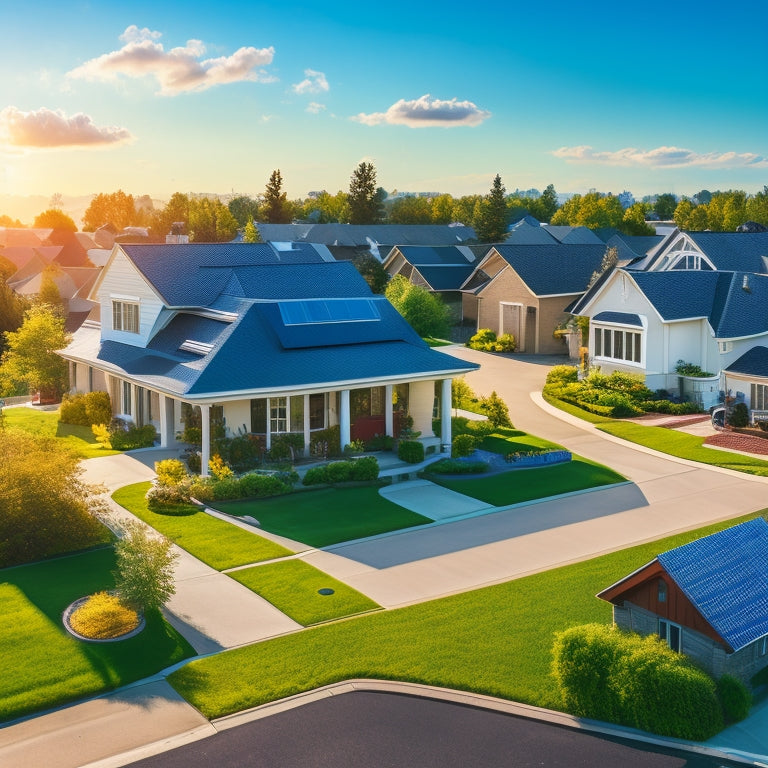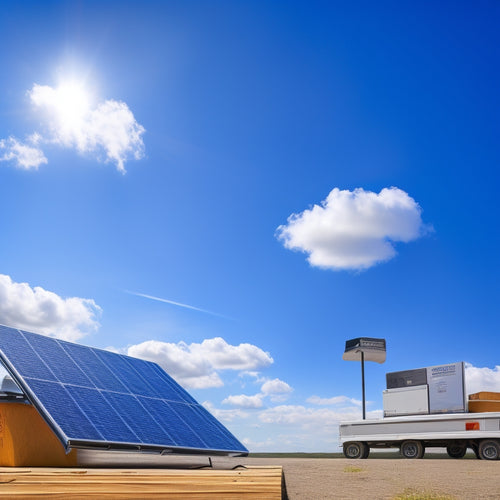
Find Affordable Solar Panels for Your Home
Share
You can invest in affordable solar panels for your home, reducing your energy bills and carbon footprint, with costs ranging from $15,000 to $30,000 and available financing options. To find the best fit, consider factors like market trends, government policies, and panel quality that affect prices. You can also explore bulk purchasing, rebates, and certified pre-owned panels to reduce upfront costs. By understanding these factors, you'll be able to make an informed decision about investing in solar energy for your home. As you explore your options, you'll discover more ways to save and make a positive impact on the environment.
Key Takeaways
• Consider bulk purchasing or refurbished panels to reduce upfront costs and enjoy significant savings.
• Explore zero-down financing options with flexible payment plans and varying interest rates.
• Research local incentives, such as state rebates, city grants, and property tax exemptions, to maximize savings.
• Evaluate solar panel brands, warranties, and customer support to find the best value for your budget.
• Look for certified pre-owned panels that offer inspected quality at lower costs, ensuring affordability and efficiency.
Understanding Solar Panel Costs
Understanding the costs involved in installing solar panels is crucial, and this understanding depends on various key factors, including the type and quality of equipment, installation company, and local incentives.
To make an informed decision, it's vital to grasp the cost breakdown of solar panels. A typical solar panel system can cost anywhere from $15,000 to $30,000 or more, depending on the system size and quality. However, with the federal solar investment tax credit, you can claim 26% of the total cost as a tax credit, greatly reducing your upfront expenditure.
Furthermore, energy savings from solar panels can help you recoup your investment over time. According to the US Department of Energy, a typical residential solar panel system can save homeowners between $400 and $1,000 annually on their energy bills. This translates to a payback period of around 5-7 years, depending on your energy consumption and local electricity rates.
Factors Affecting Solar Panel Prices
As you evaluate the costs and benefits of installing solar panels, it's important to take into account the various factors that influence their prices. One key factor is market trends, which can impact the demand and supply of solar panels. When demand is high, prices tend to rise, and vice versa.
Additionally, government policies can greatly affect solar panel prices. For instance, tax credits and incentives can reduce the upfront cost of installation, making solar energy more accessible to homeowners. Moreover, policies like net metering laws can also impact the cost of solar panels by allowing homeowners to sell excess energy back to the grid.
Additionally, the type and quality of solar panels, as well as the installation company you choose, can also influence the final cost. By understanding these factors, you can make an informed decision about investing in solar energy for your home.
Benefits of Buying in Bulk
Buying in bulk can greatly reduce the upfront cost of solar panels, making this approach an attractive option for homeowners looking to invest in renewable energy. When you purchase solar panels in bulk, you can take advantage of wholesale discounts, which can lead to significant cost savings. This is because suppliers offer lower prices for large quantities, allowing you to benefit from economies of scale.
By buying in bulk, you can reduce the cost per unit, making solar energy a more affordable option for your home. Additionally, bulk purchasing can also simplify the installation process, as you'll have all the necessary equipment and materials in one place. This streamlined process can save you time and money, making it an attractive option for homeowners who want to switch to renewable energy.
Discount Solar Panels for Homes
Discount solar panels for homes can be sourced from various suppliers, offering homeowners a range of affordable options to suit their energy needs and budget. By exploring discount solar panels, you can enjoy significant Solar Savings while shifting to an Eco Friendly energy solution.
Here are some ways to capitalize on discounted solar panels:
-
Rebates and Incentives: Take advantage of government-backed incentives and rebates to reduce the upfront cost of solar panel installation.
-
Refurbished or Used Panels: Consider purchasing refurbished or used solar panels that are still efficient and reliable, but at a lower cost.
-
Bulk Purchases: Buying in bulk can lead to significant discounts, making solar panels more affordable for homeowners.
-
Discounted Installation: Look for installation companies that offer discounted rates for solar panel installation, reducing your overall expenditure.
-
Certified Pre-Owned Panels: Opt for certified pre-owned solar panels that have been inspected and certified by the manufacturer or a third-party organization.
Comparing Solar Panel Brands
When evaluating solar panels for your home, you'll likely come across various brands, each boasting unique features, warranties, and price points, so it's important to compare them to find the best fit for your energy needs and budget.
As you research, consider factors like panel quality, warranty duration, and customer support. Some brands prioritize efficiency, while others focus on durability. Assess your energy goals and prioritize accordingly. Brand loyalty can be a significant factor, as established brands often provide better warranties and customer support.
Look for brands with a proven track record of producing high-quality panels that can withstand harsh weather conditions. Be wary of extremely cheap options, as they might compromise on panel quality. Instead, focus on mid-range brands that balance quality and affordability.
Certified Pre-Owned Solar Panels
You can opt for certified pre-owned solar panels, which undergo rigorous testing and refurbishment to guarantee they meet industry standards for performance and safety. These panels offer a cost-effective alternative to new solar panels, making them an attractive option for homeowners on a budget. By choosing certified pre-owned solar panels, you can enjoy substantial savings without compromising on quality.
Here are some benefits to keep in mind:
-
Warranty Coverage: Certified pre-owned solar panels often come with a warranty, providing you with peace of mind and protection against defects or malfunctions.
-
Resale Value: Installing certified pre-owned solar panels can increase your home's resale value, making it more attractive to potential buyers.
-
Environmental Benefits: You'll reduce your carbon footprint and contribute to a cleaner environment by harnessing renewable energy.
-
Energy Savings: Certified pre-owned solar panels can greatly reduce your energy bills, saving you money in the long run.
-
Reliability: These panels are thoroughly tested and refurbished to make sure they meet industry standards for performance and safety.
Solar Panel Financing Options
As you consider installing solar panels on your home, you're likely wondering how to make this eco-friendly investment a financial reality.
Fortunately, there are various financing incentives and payment plan options available to help offset the upfront cost.
In the following sections, we'll break down the financing options and explore how you can take advantage of them to make solar energy a more affordable choice for your home.
Financing Incentives Explained
Solar panel financing options abound, offering homeowners various ways to offset the upfront costs of solar panel installation. To make the shift to renewable energy more economical, you can take advantage of various financing incentives. These incentives can greatly reduce the financial burden of switching to solar power.
Some of the notable financing incentives include:
-
Government Rebates: Receive cash back from the government for installing solar panels, making the initial investment more manageable.
-
Tax Exemptions: Enjoy exemptions from sales tax, property tax, or other local taxes, reducing your overall expenses.
-
Net Metering: Sell excess energy back to the grid and offset your energy bills, generating revenue.
-
State and Local Incentives: Tap into state and local programs offering rebates, grants, or low-interest loans for solar installations.
-
Utility-based Incentives: Partner with your utility company to access exclusive financing options, discounts, or special rates.
Payment Plan Options
By exploring payment plan options, homeowners can break down the upfront cost of solar panel installation into manageable monthly payments, making the shift to renewable energy more accessible.
You can choose from various financing options that cater to different budgets and financial situations. One popular option is zero-down financing, which allows you to install solar panels without an initial payment. This option is ideal for homeowners who want to start saving on their energy bills immediately.
Most payment plans offer flexible monthly payments that can be tailored to your budget. Be sure to review the interest rates associated with each plan, as they can vary greatly. Some financing options may offer fixed interest rates, while others may have variable rates that can change over time.
It's crucial to carefully review the terms and conditions of each plan to make sure you're getting the best deal. By weighing your options carefully, you can find a payment plan that makes going solar a financially viable decision for your home.
DIY Solar Panel Installation
You'll need to carefully evaluate your roof's structural integrity and electrical connections before starting a DIY solar panel installation project. This is important to guarantee a safe and efficient installation. With the right preparation and Solar expertise, you can enjoy significant DIY savings on your solar panel installation.
However, it's crucial to take into account the following key factors before diving into the project:
-
Roof size and orientation: Make sure your roof receives sufficient sunlight and is large enough to accommodate the solar panels.
-
Local building codes: Familiarize yourself with local regulations and permits required for DIY solar panel installations.
-
Electrical connections: Verify that your electrical panel can handle the additional power output from the solar panels.
-
Roof material and condition: Ensure your roof is in good condition and compatible with solar panel installation.
-
Solar panel quality: Choose high-quality solar panels that meet your energy needs and budget.
Local Incentives for Solar Energy
With your DIY solar panel installation project underway, it's equally important to explore the local incentives that can greatly reduce the upfront costs and maximize your return on investment. You can substantially benefit from state and local government initiatives that encourage the adoption of renewable energy sources.
| Incentive Type | Description | Benefits |
|---|---|---|
| State Rebates | Rebates provided by state governments to offset initial costs | Up to 20% of total installation cost |
| City Grants | Grants offered by local governments for solar installations | Up to $10,000 per project |
| Property Tax Exemptions | Exemptions from property tax increases due to solar installations | Savings on property taxes |
| Sales Tax Exemptions | Exemptions from sales tax on solar equipment purchases | Savings on equipment costs |
| Net Metering | Credit for excess energy produced and fed back into the grid | Reduced energy bills |
Frequently Asked Questions
Do Solar Panels Work During a Power Outage?
During a power outage, you'll need backup systems like energy storage solutions, such as batteries, to keep your solar panels generating power, as they won't work independently without a connection to the grid.
Can I Install Solar Panels on a Rented Property?
Since you're worried about not owning the property, you'll need to review your renter's rights and negotiate a landlord agreement before installing solar panels on a rented property, ensuring a mutually beneficial arrangement.
How Often Should I Clean My Solar Panels?
You should clean your solar panels every 6-12 months to maintain peak energy efficiency, as dirty panels can reduce energy output by up to 25%, making regular panel maintenance essential for maximizing power generation.
Are Solar Panels Resistant to Hail and Extreme Weather?
You're right to wonder if solar panels can withstand harsh weather. Manufacturers put them through rigorous Weather Testing, ensuring Storm Durability. Most panels can resist hail up to 1 inch in diameter and extreme winds up to 140 mph.
Can I Sell Excess Energy Back to the Grid?
"Unlock the power within! You can sell excess energy back to the grid through Net Metering, a process that measures your energy production and consumption, allowing you to trade excess energy through Energy Trading programs."
Related Posts
-

Why Choose Affordable Electric Scooters for Urban Commuting
By choosing an affordable electric scooter for urban commuting, you'll not only reduce your transportation costs by u...
-

7 Best RV Battery Charging Panels for Your Adventures
You're searching for reliable and efficient solar charging solutions to power your RV battery on the go. Explore top-...
-

7 Essential Tips to Buy Discounted Solar Panels Online
When purchasing discounted solar panels online, you'll want to research top brands like SunPower, Panasonic, and LG, ...


